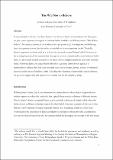The will not to believe
Abstract
Is it permissible to believe that God does not exist if the evidence is inconclusive? In this paper, we give a new argument in support of atheistic belief modelled on William James’s The Will to Believe. According to James, if the evidence for a proposition, p, is ambiguous, and believing that p is a genuine option, then it can be permissible to let your passions decide. Typically, James’s argument has been used as a defence of passionally caused theistic belief. However, in the existing literature, little attention has been given to topic of passionally caused atheistic belief. Here, we give much needed attention to the issue of how areligious passions can justify atheistic belief. Following James, we argue that if atheism is a genuine option for an agent, it is permissible to believe that God does not exist based on her hopes, desires, wishes, or whatever passions incline her to disbelieve. After defending the coherence of passionally caused atheism, we go on to suggest why this position is a tenable one for the atheist to adopt.
Citation
Cockayne , J & Warman , J 2019 , ' The will not to believe ' , Sophia , vol. 58 , no. 3 , pp. 511-523 . https://doi.org/10.1007/s11841-018-0689-y
Publication
Sophia
Status
Peer reviewed
ISSN
0038-1527Type
Journal article
Collections
Items in the St Andrews Research Repository are protected by copyright, with all rights reserved, unless otherwise indicated.

